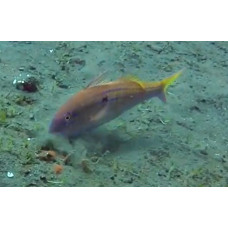Latin name
Parupeneus heptacanthus
Other name
Parupeneus heptacanthus
Identification
Have 16 thoracic rays (rarely 15 or 17). Gill rakers 6-7 + 29-23 (total 26-30). Body depth 2.95-3.55 inches; head length (HL) 2.9-3.25 inches; snout length 1.75-2.1 inches; antennal length 1.15-1.35 inches; posterior end of maxilla uniformly convex; longest dorsal spur 1.45-1.75 inches; penultimate dorsal ray 1.05-1.25 inches long last dorsal ray; pectoral fin length 1.25-1.4 cm; pelvic fin length 1.4-1.6 cm.
Features of fish fins
Dorsal spines (total): 8; Dorsal soft rays (total): 9; Anal spines: 1; Anal soft rays: 7.
Fish colouring
Body brownish-yellow to light red (more red in deep-sea fish), scale edges darker, becoming silvery white on the abdomen; adults with a small reddish-brown spot on the upper side of the body just below the seventh and eighth lateral scales; indistinct narrow yellow stripe often visible above the lateral scales. Dorsal body scales often with a pale blue or pearly spot; faint iridescent blue lines running from the eye dorsoposteriorly and ventroanteriorly, and often a parallel line on the cheek below the eye; second dorsal and anal fins with faint pale blue or pink narrow stripes alternating with pale yellow.
Distribution
Indo-West Pacific: Red Sea and east coast of Africa to the Caroline Islands and Fiji.
Habitat
Marine tropical species associated with reefs. Depth range from 12 to 350 meters. Prefers brackish water.
Size
Maximum length 36 cm. Total length 25 cm. Maximum declared weight 877 g. Maximum declared age 6 years.
Behavior
They are found singly or in small groups on the muddy, sandy, rocky or algae-covered bottoms of lagoons and coastal reefs.
Food and feeding habits
They feed mainly on crustaceans, crab larvae and fish.
Reproduction
Females spawn in batches, and after fertilization, the eggs rise to the top of the water.
Fishing
This species has commercial value in fisheries.
Relationship with a person
Harmless. The flesh of these fish is quite suitable for human consumption.
| Classification | |
| Phylum | Chordata |
| Class | Actinopterygii |
| Squad | Perciformes |
| Family | Mullidae |
| Genus | Parupeneus |
| Species | P. heptacanthus |
| Features | |
| Conservation status | Least Concern |
| Habitat | Pelagic |
| Life span, years | 6 |
| Maximum body weight, kg | 0,877 |
| Maximum length, cm | 36 |
| Sailing speed, m/s | No information |
| Threat to people | Edible |
| Way of eating | Predator |
Cinnabar goatfish
Tags: cinnabar goatfish


